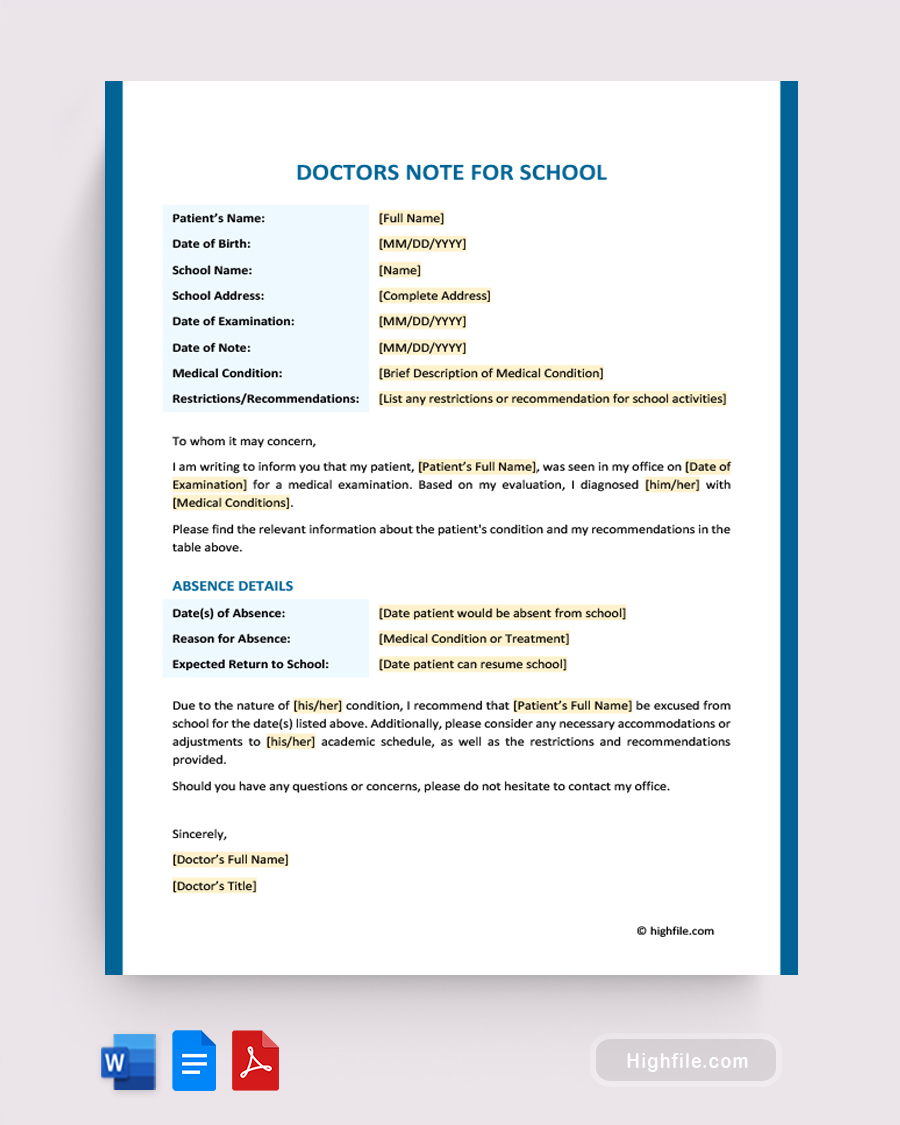Missing classes impacts a student’s attendance and can hurt their GPA if the work isn’t made up on time. Worse still, unexcused absences can lead to being expelled from school entirely. Fortunately, if a student is absent because of a doctor’s visit or emergency room trip, they can get a note from the doctor. A doctor’s note for school can help prevent problems by providing a legitimate excuse for missed time. It can also help a student get the necessary accommodations. We’ll teach you everything you need to know about these crucial forms and how using a template can save you time and effort.
What Is a Doctors Note For School?
A doctor’s note for school is a document that verifies a student’s medical condition and explains the need for absence or accommodation in school. The note is typically issued by a licensed healthcare provider, such as a doctor, nurse practitioner, or physician assistant. It may include the student’s diagnosis, treatment, and expected recovery time. A doctor’s note for school can be used to support a request for excused absence. Schools often require this note as part of their attendance and academic policies to ensure that students receive appropriate support and accommodations for their medical needs.
Why Is Doctors Note For School Important?
A doctor’s note for school is important for ensuring the health and academic success of the student, as well as protecting both the school and the student from legal issues. Here are the benefits of these vital documents:
- Verification of illness: A doctor’s note confirms that a student could not attend school due to an illness or medical condition, ensuring the student’s absence is legitimate and not due to truancy.
- Academic accommodations: The note may also outline any academic accommodations that the student may need, such as extra time for assignments or exams, due to their medical condition.
- Legal protection: A doctor’s note provides legal protection for the school and the student by verifying the medical condition and absence.
- Preventing the spread of illness: If a student is contagious, a doctor’s note can help prevent the spread of disease by advising the student to stay home until they are no longer contagious.
- Health monitoring: A doctor’s note can also help the school monitor the student’s health and provide necessary support or resources.
- Access to medical care: In some cases, a doctor’s note may also refer a specialist or other medical care provider who can provide further treatment or support for the student’s condition.
When a Doctors Note for School is Needed?
A doctor’s note for school is typically needed when a student’s medical condition may impact their ability to attend school or participate in school-related activities. Here are some examples:
- Absences and emergencies: When a student misses school due to illness or a medical emergency, a doctor’s note may be required to verify the reason for the absence.
- Participation exemptions: If a student cannot participate in physical education or other activities due to a medical condition, a doctor’s note may be needed to exempt them from participation.
- Field trips: Some schools may require a doctor’s note for students to participate in field trips, particularly if the trip involves physical activity or has potential risks.
- Vaccination exemptions: A doctor’s note may be needed to exempt a student from vaccination requirements due to medical reasons.
- Medical accommodations: If a student requires academic accommodations due to a medical condition, a doctor’s note may be needed to verify the need for accommodations.
- Return to school: If a student has been absent due to a medical condition, a doctor’s note may be required to verify that they can return.
- Surgeries or appointments: If a student is scheduled for surgery or a medical appointment requiring them to miss school, a doctor’s note helps validate the medical necessity.
Essential Elements of Doctors Note For School
The essential elements of a doctor’s note for school include:
- Clinic or hospital name: The name of the healthcare facility where the medical consultation occurred.
- Document title: The document’s title, such as “Doctor’s Note.”
- Certificate of medical consultation: A statement indicating that the student received medical consultation from the healthcare provider.
- Doctor’s remarks: A detailed description of the student’s medical condition, treatment plan, and necessary accommodations.
- Formal closing and signature: A proper closing like “sincerely” followed by the doctor’s signature.
- Medical Facility Contact Information: The healthcare facility’s contact information, including the address, phone number, and email address.
How to Request a Doctor’s Note for School Absences or Accommodations
To request a doctor’s note for school absences or accommodations, follow these steps:
- Contact your child’s healthcare provider: Reach out to your child’s doctor to explain the situation and request a note.
- Provide necessary information: Be prepared to provide the doctor with the details of the absence or accommodations needed and any necessary documentation or forms from the school.
- Schedule an appointment: If the doctor agrees to provide a note, schedule an appointment to discuss the situation and receive the note.
- Obtain the note: Following the appointment, obtain a signed and dated note from the doctor that includes the necessary information, such as the medical condition, treatment plan, and necessary accommodations.
- Submit the note to the school: Submit the note to the appropriate school staff member, such as the school nurse or principal, as soon as possible to ensure that the student’s absence or accommodations are properly documented and approved.
It’s important to note that this works a little differently in emergencies. If the student was in urgent care or the emergency room, parents or legal guardians can request a note while they are at the medical facility to show why they were examined.
FAQs
A school can refuse to accept a doctor’s note if it doesn’t meet certain criteria or contains incomplete or insufficient information. Schools have the right to establish policies and procedures regarding the acceptance of doctor’s notes. These policies may vary depending on the school and the requested absence or accommodation.
Schools collaborate with healthcare providers and families to support students with chronic illnesses or ongoing medical needs. A doctor’s note may be required to outline the medical condition, treatment plan, and necessary accommodations. An individualized plan may include extended absences, flexible scheduling, modified assignments, or assistive technology. The aim is to support students to participate fully in school while managing their medical condition.
Here is a list of potential consequences for not submitting a doctor’s note for school when required:
ᐅ Unexcused absences: Could result in disciplinary action or lower grades
ᐅ Loss of privileges: Lost privileges such as participation in extracurricular activities and sports
ᐅ Legal consequences: May result in legal consequences for the student and their parents or guardians
ᐅ Difficulty keeping up with school work: Students may find it challenging to keep up with school work and may struggle academically
ᐅ Impacts on college applications: May impact a student’s college applications and future opportunities
Key Point
Having a doctor’s note for school can significantly help students achieve their academic goals. It also helps schools verify legitimate absences and protect themselves legally since they are often required to verify students’ whereabouts when they aren’t in a scheduled class. Using a template to create your doctor’s notes for school can save you time and help ensure the student you examined has the appropriate paperwork to return to classes or get the accommodations they need.







